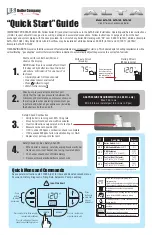
3
USER GUIDE
2
USE OF THE BOILER
To ensure that your system operates correctly, please
have it serviced annually by a qualified engineer;
servicing should be completed before the start of the
heating season.
Starting the burner:
in normal operation the burner starts automatically if
the temperature of the boiler is below the set point.
Before carrying out any work on the boiler, isolate it
from the electrical supply at the switch on the external
control box.
Also place the main switch on the control panel to
“OFF”.
You should familiarise yourself with the control panel
(fig. 1)
The user must not attempt to gain access to the
components inside the control panel.
1. Control thermostat
When the boiler is used for heating only, the boiler temperature may
be set at 60 to 90°C. If the boiler is used to generate domestic hot
water and heating, the boiler’s control thermostat should be set at
80°C to ensure optimum operating conditions.
2. Main switch
Use this switch to turn the boiler on and off.
3. Summer/Winter switch
Use this switch to start and stop the heating pump.
4. Thermostat-pressure gauge
This gauge shows the temperature of the boiler and the pressure in
the primary heating circuit. The temperature must not exceed 90°C.
If it rises above this point, turn off the boiler and check the settings
on the thermostat. If the problem persists, call a technician.
The pressure must not fall below 1 bar. If it does fall below this point,
look up the section entitled “Gauge pressure of the heating installation”
in this section below.
5. Manual reset high-limit thermostat
If the boiler temperature exceeds 103°C, this safety device will be
enabled. The boiler temperature must drop below 60°C to re-start.
Unscrew the cover and press the re-start key with a pen or an object
with a similar sharp point. Replace the cover. If the fault persists,
turn off the boiler and call a technician.
Pump operation:
The pump is controlled by a reset high limit thermostat, which is
located at the rear of the boiler. This is pre-set at 45°C. When the
boiler starts up, it delays the activation of the boiler pump, thereby
preventing any risk of corrosion in the combustion chamber.
Gauge pressure of the heating system
Your system must be fitted with a heating safety valve calibrated to
3 bars.
Ensure that the system is always under water pressure. When the
system is cold and the air inside it has been vented, the gauge
must indicate a pressure between 0.5 and 1.5 bar depending on
the height of the building.
To add water:
(refer to Fig. 10 on Page 7)
• Open the filling valve (5).
• Close the valve properly after filling.
• Vent the system in order to obtain an accurate reading of the
pressure inside the heating circuit.
Safety valves
(heating circuit)
If water is found to be escaping from one of the safety valves, stop
the boiler and contact your installer for advice.
A monthly test is recommended:
Lift the lever on the drain cock for a few seconds to ensure that the
safety valve is working correctly.
If there is a problem after this short test, please
contact your installer for advice.
The water escaping from the safety valve can
be extremely hot and cause serious burns.
D A N G E R
HOT
fig. 1 : Control panel
fig. 2 : N-Mini Control panel
60
90
2
5
1
3
3
BURNER SHUTDOWN
If the burner is not working:
1. The burner indicator lamp lights up.
2. Press the burner reset button
(Fig. 3)
on the burner. Turn the
boiler off for several seconds at the main switch, then restart the
boiler.
3. If the burner still does not work, rearm the manual reset highlimit
thermostat on the control panel
(Fig. 4)
.
4. If the anomaly persists, please contact your installer.
fig. 3
fig. 4
45
30
15
0
90
75
60
°C
3
1






































